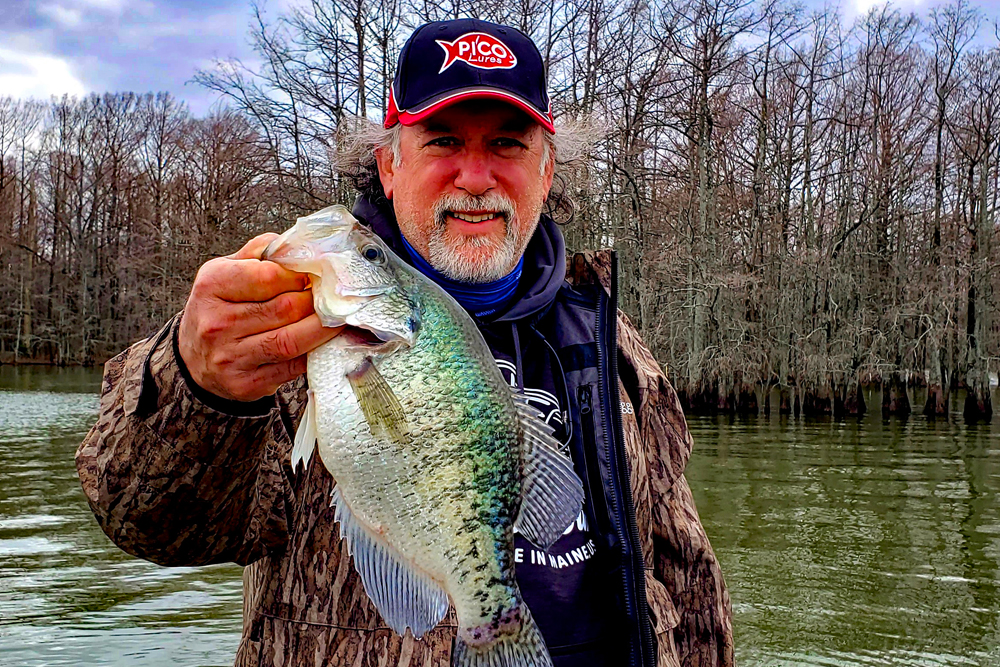The author, Ken Perrotte, is understandably pleased with this Lake Washington slab. Much of what Perrotte learned on Lake Washington will translate to other shallow-water lakes in the wintertime.
Destination: Lake Washington and Greenville, Mississippi
by Ken Perrotte
A fun year-round crappie hotspot for the whole family
The Mississippi Delta is a magical place – an incredible expanse of lowlands that flooded across millennia, a waterfowl paradise and the cradle of the blues. Oxbow lakes, like Lake Washington, formed where the river once flowed and now stand alone, cutoff from the mighty Mississippi by levees and other human interventions designed to mitigate flooding.
One of the lakes on Mississippi’s official “Crappie Trail,” Lake Washington is often hailed as one of the nation’s best crappie fishing destinations. Biologists say the legendary slab-sized fish of that region grow fast, reaching a couple pounds in just three years, according to Mike Jones of the Bait-N-Thangs tackle shop located 20 miles south of Greenville and a hub of lake fishing activity.
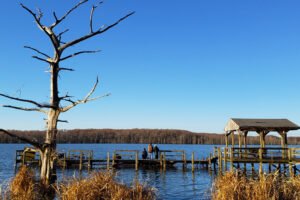
Ordinarily, crappie fishing begins to really turn on as water temperatures warm in late February. Spring can come early in the Delta. Our three-day crappie camp at the end of February, though, saw the lake just beginning to thaw following 10 consecutive days of snow, ice and freezing temperatures. That area seldom sees winter weather that’s more akin to Michigan.
Warming temperatures over the next two days, however, saw steady improvement.
Fishing with Arkansas guide and Pico Lures professional Greg Robinson, we tried spider rigging and Garmin “live-scoping” in the main lake, figuring the fish would be as deep as possible in the slowly warming lake. The LiveScope transducer mounted on the trolling motor gave us a good, stealthy look about 25 feet from the boat.
The fish must have stayed in the shallow waters near the cypress, perhaps picking up warmth near the trees’ submerged trunks. As the water slowly warmed in afternoon, the bite picked up. We had cracked the code!
Before the sustained cold front, crappie were already staging in the cypress groves, ready for the water temperatures to trigger spawning. We slowly picked up a couple fish before Robinson adjusted strategy and tested the shallow waters of the cypress forest. Spider rigging was difficult amid the trees and he soon switched to using a single rod, pitching slip-bobbered jigs to fish marked on his LiveScope monitor or simply casting to any open pocket of water. The fish must have stayed in the shallow waters near the cypress, perhaps picking up warmth near the trees’ submerged trunks. As the water slowly warmed in afternoon, the bite picked up. We had cracked the code!
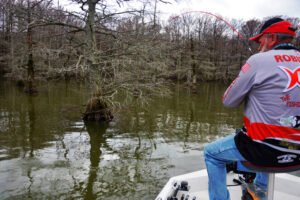
Orange was the hot color this day, but Pico Lures owner Mitch Glenn said any color can catch fish. Selection depends on water conditions, the sky, and the mood of the fish. You have to figure it out. When fish are picky, giving them something with a lot of contrast often helps, Glenn said.
My final trip on Lake Washington was a “long-lining” (trolling) expedition with professional crappie fishing angler and guide Brad Chappell. Chappell is a go-to guide on Lake Washington and he graciously shared his technique for catching lots of fish.
Chappell trolled with eight rods of varying lengths, each rigged with double jig sets. He ties the jigs to the main line with lengthy loops, a technique he says ensures free-swimming lures and minimal entanglements. While other anglers picked up a few fish here and there on day three of our fishing camp, Chappell loaded his live well with a limit of crappie.
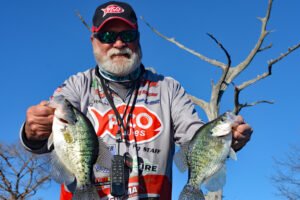
Jones said crappie fishing – all fishing, really — is good year-round at Lake Washington, as well as nearby Lake Ferguson and Lake Lee.
“You just have to change your way of fishing,” Jones said. “Crankbaits have become a big way to fish in the last few years. Trolling, spider rigging and live scoping are still great as well, especially in cooler months.”
Jones said single-pole jig fishing in the trees is popular in spring and winter, but late spring and early summer is prime time as well, with feisty bluegill to 1.5 pounds also hammering baits. Summer means catfish anywhere in the lake while the crappie tend to look for shade beneath or deeper water around structure.
Fish, Explore, Eat, Get Spooked!
The Lake Washington and Greenville area has loads of fun things to do away from the crappie fishing.
The Greenville and Washington County Convention and Visitors Bureau is a good one-stop shop for all things to see and do in this part of the Mississippi Delta. Somewhat surprisingly, the area is famous for “hot tamales,” sporting a Mississippi Delta Hot Tamale Trail.
Food festivals such as the Southern Food Festival, usually staged in October, feature tamales front and center. The festival features a hot tamale cooking contest, a tamale eating contest and a “Miss Hot Tamale” contest.
Many legendary musical artists were born and raised in the area, including Muddy Waters, B.B. King, John Lee Hooker, Son House, Ike Turner, Jackie Brenston, Sam Cooke, Junior Parker and W. C. Handy. Music lovers will want to schedule fishing trips around one of the several blues festivals in the area, including the Mississippi Delta Blues and Heritage Festival, usually held in August and now in its 44th year.
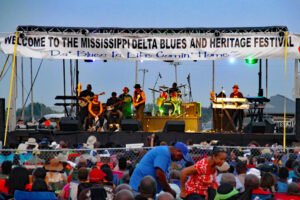
About 70 miles north of Greenville in Clarksdale is the renowned Delta Blues Museum. Located in downtown Leland, a few miles east of Greenville, the Highway 61 Blues Museum has an eclectic collection chronicling the area’s mid-Delta musicians with posters, clothing, instruments and clippings that gives a real feel for blues as a lived culture. Nearby streets feature murals honoring many of the same musicians.
The Greenville Speedway, a 1/4-mile “gumbo” track, is usually operating February to October, offering a variety of races for dirt track aficionados.
When it comes to dining, one place you don’t want to miss is Greenville is Doe’s Eat Place, a Greenville fixture since 1941. In a segregated South, the converted grocery store was unique, the front being a honkytonk with a strictly black clientele while white customers came in through the back door. The specialty, then and now, are Big Doe’s incredible steaks.
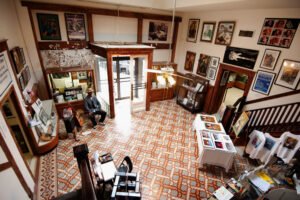
You walk in through the kitchen! Two large two broiler grills are typically loaded with dozens of steaks. A nearby table holds massive rib eyes and porterhouses, plus filets, waiting to be cooked. As soon as you walk past the delectable beef, you pass the French fry station with its mountain of homemade, thick fries.
Lodging options are varied, with a couple hotels and a few bed and breakfast operations, including two beautiful old mansions. Belmont Plantation, established in 1857, has the last antebellum mansion along the river in the Mississippi Delta. The massive (9,000 square feet) house and grounds are extensively restored. It is also available for weddings, events, tours and corporate retreats. It is also used a movie set on occasion.
It’s also haunted. It appears I had an extremely close encounter with the spirit world during my stay.
As I pulled the covers on the bed to turn them down from the pillow, I thought I felt the bed bump back at me. I chalked it up to the bed, maybe, shifting a little as I tugged the covers. I turned to sit on the bed while I reset the alarm on my smartphone for an early morning fishing wakeup. I sat down and within seconds felt a heavy weight plop down on the bed a couple feet to my right, as in right next to me!
Startled and just a little nervous, I set the phone on the table and laid down, turning out the light. About 5 to 10 minutes later, there came three pushes on the bed to my right, sort of like a big dog walking there. I flicked on the light and heard women’s voices, having a muffled, engaged conversation. It sounded like it was coming through a wall or up from the ground floor, where the B&B manager and a guest had been talking when I went to my room.
I learned the next morning that the guest had left 5 minutes after I went to my room. Nobody was talking. I also learned that another angler in a room two doors down from me also experienced weird pushing on his bed. It turns out the room in between us is often the site of paranormal activity and sightings, by both guests and staff.
Believe it, or not.
(Ken Perrotte is a veteran outdoor writer from King George, Virginia. He is the current President of the Association of Great Lakes Outdoor Writers. Check out more of his work, including his ghostly experience and a video with Camille Collins, the B&B manager, at the Outdoors Rambler website.)


